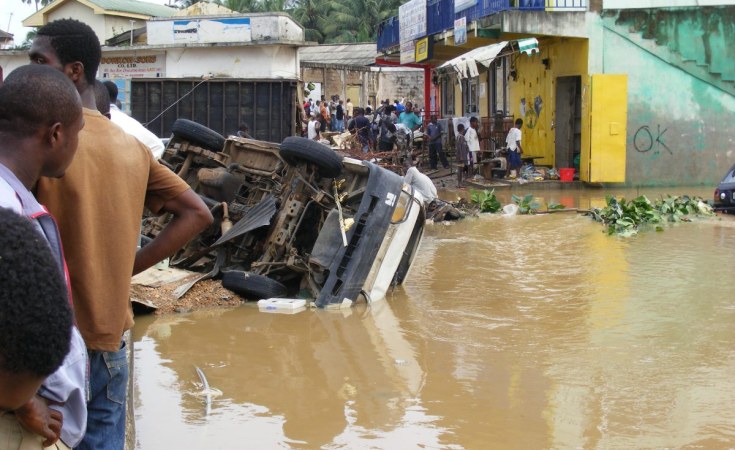A torrential downpour that began around 3:00 p.m. on Sunday has once again exposed the vulnerabilities of Accra’s infrastructure, leaving large portions of the capital and surrounding municipalities submerged and virtually paralyzed for hours.
The nearly three-hour rainfall, which coincided with the evening rush hour, caused severe flooding across several neighbourhoods, including Weija, Kaneshie, Adabraka, Adentan-Dodowa, and parts of the Tema enclave. Traffic came to a standstill as major roads—such as the stretch from Awudome Roundabout to the Obetsebi Lamptey Interchange—became impassable, with stranded vehicles and broken-down cars clogging intersections.
In the Adjei-Kojo Kanewu area of Tema West, the situation was particularly dire. Residents reported extensive water damage to their homes and properties.
They attributed the flooding to construction activities by Letap Pharmaceuticals, a local company accused of obstructing the area’s main drainage channel.
“The drainage system has been blocked, and every time it rains, the water backs up into our homes. We are suffering. We need immediate intervention from the authorities,” a visibly frustrated resident said.
Community members have called for urgent government action, alleging that the company’s operations have worsened the area’s flood risk over time.
While residents in various parts of the capital battled rising water levels, local youth in Okaikoi South sprang into action, helping redirect traffic and prevent vehicles from plunging into open drains or deep potholes hidden beneath floodwaters. Their efforts helped avert further chaos along the Awudome-Awudome Cemetery stretch.
Authorities have since issued advisories urging residents to remain indoors and avoid flood-prone areas. Public health officials have also warned against walking through floodwaters, citing the risk of waterborne diseases due to possible contamination.
Urban planning experts and civil society groups have renewed calls for improved drainage infrastructure and stricter enforcement of building regulations to mitigate the annual recurrence of such disasters.
As emergency services and NADMO teams continue to respond, many affected residents say they are tired of temporary relief efforts and want long-term solutions to Accra’s perennial flooding problem.
